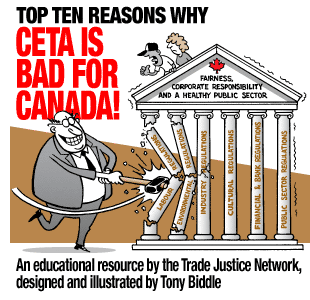 |
| This download is one of the many documents that you can read about the CETA agreement |
PV Vancouver Bureau
Like a freight train racing downhill without brakes, the "Comprehensive Economic and Trade Agreement" negotiations between Canada Union of Public Employees and the Council of Canadians are trying to stop CETA before it's too late, but a ninth round of negotiations has been completed. The federal government says that "significant progress has been made across the board, including the areas of goods, services, investment, government procurement and many others. The negotiating text is now well-advanced, with many chapters closed or parked pending further development, and issues in the remaining chapters narrowed down to key differences where solutions are now being actively explored."
Stressing their goal of "resisting protectionist pressures in challenging economic times," the Harper Tories want to wrap up talks quickly, with the aim of concluding CETA this year.
What's the big rush? It's all about money, markets, and profits. With a population of 500 million and a GDP of $17 trillion, the EU member states represent Canada Canada Canada Canada
While the Harper government claims to "appreciate the input of all Canadians" in this process, only the business sector has actually been consulted. Working people who will pay the price through lower living standards, lost jobs, and increased environmental degradation have been kept completely out of the loop. Here are some examples of the potential impacts.
Failure to protect water services
Recently leaked documents show that Canada
The documents, made public by the Quebec Network on Continental Integration (RQIC) and the Trade Justice Network, show Canada
"The two biggest private water utilities in the world are European and eager to use CETA to gain access to Canada Canada
"Canadians hold a great deal of trust in publicly owned, operated and delivered water and sanitation systems," says CUPE National President Paul Moist. "Water and other essential services like health care, public transit, postal services and energy are vital to our communities. If European negotiators are prepared to protect those sectors why isn't Canada
CUPE and the Council of Canadians are asking that provincial governments correct their mistake by fully excluding drinking water and wastewater services from trade offers. The organizations also urge the provinces to withhold support for the CETA negotiations until the public and opposition parties have had a chance to study and make revisions to these offers and the broader Canada‑EU agreement. There could be many other areas, for example public transit, health care, education, etc., which should be protected but which the provinces have not carved out of the CETA.
Hidden threats to municipalities
"This agreement with the EU has far reaching implications for city policies and could hurt our ability as councillors to promote local jobs or small business, create incentives for investment in Toronto, protect the environment or otherwise use public spending as a way to stimulate growth," said Councillor Glenn de Baeremaeker.
"From what I can see, the CETA would be all risk and little reward for Toronto Toronto
Wong‑Tam and de Baeremaeker spoke in support of a motion recommending that City Council request the Province of Ontario to issue a clear, permanent exemption of Toronto from the CETA, and "protect the powers of municipalities, hospitals, school boards, utilities, universities and other sub‑federal agencies to use public procurement, services and investment as tools to create local jobs and otherwise support local economic development."
As a participant in the CETA negotiations, Ontario
The Trojan Horse appeared before the gates of Parliament in Ottawa Quebec
Already over 20 municipal governments have requested to be excluded from the EU deal.
Trampling the Investment Canada
The federal government has been accused of ignoring Canadian law and approving the takeover of Canadian book publisher McClelland & Stewart by a multinational corporation, to help clear obstacles for CETA.
"It would seem that the government is running roughshod over the Investment Canada
Questions remain about the legality of the McClelland & Stewart takeover, approved behind closed doors by Minister of Canadian Heritage and Official Languages James Moore. Reports indicate Moore was approached by Random House to seek an exemption from provisions of the Investment Canada Act which require a review of foreign takeovers of Canadian publishing firms to ensure these are of "net benefit to Canada
"This development highlights the reason we need a complete cultural exemption from the CETA," says Garry Neil, Executive Director of the Council of Canadians. "The federal government should force Random House to offer the 75 percent stake in McClelland & Stewart previously held by the University of Toronto
Established in 1906, McClelland & Stewart has published books by Maude Barlow, Margaret Atwood, Farley Mowat, Margaret Laurence, Pierre Berton, L.M. Montgomery, Michael Ondaatje, and many other Canadian authors.









No comments:
Post a Comment